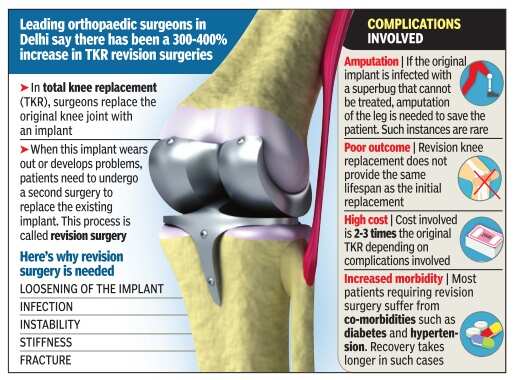Leading orthopaedic surgeons said that there has been a 300-400% rise in such surgeries due to increased incidence of infection in the implants, followed by loosening, instability and fractures.
“In 2006, we used to conduct 12 to 13 TKR revisions annually of which 8-10% were for infection. In 2016, the numbers were three to four revisions monthly in which 80% were for infection, 15% for loosening and instability, and the remaining 5% for fractures,” said Dr Rajesh Malhotra, professor and head of orthopaedics department at AIIMS, adding that one-third of all the revisions required bone graft from a donor.
Dr Ramneek Mahajan, director, orthopaedic and joint replacement at Max Smart Super Specialty Hospital, Saket said five years ago he did a couple of revision surgery every month, but the number has now gone up to 4-5 cases monthly (roughly 50 cases annually).
Dr Ajay Gupta, Dr Ashok Rajgopal and Dr Yash Gulati, who head the orthopaedic unit at Lok Nayak, Fortis-Escorts and Apollo Hospital respectively, also confirmed the trend.
TKR, conducted mostly on patients suffering from age-related arthritis, involves replacing natural joints with mechanical ones. When this implant wears out or develops a problem, patients are required to undergo a second surgery to replace the existing implant, which is referred to as revision surgery.
Doctors said revision surgery is more complicated than the initial operation as it involves the removal of the old prosthesis and insertion of a new one.
In addition, since tissues grow around the old knee replacement prosthesis, extracting it safely becomes a challenge.
“Most patients catch infection during implants at hospitals as sterility methods are not up to the mark in the peripheral hospitals. These are caused by bacteria, sometimes superbugs, which are difficult to treat with the best antibiotics. We have seen cases where a leg had to be amputated to save the life of a patient,” said Dr Rajgopal.
Another complication of the revision surgery is shorter lifespan. While a primary TKR provides for a lifespan of 15 to 20 years, revision surgery provides only up to 10 years.
Explaining the reasons behind the increase in revision surgery, Dr Gupta of Lok Nayak Hospital said, “Many surgeons with limited skill-set and infrastructure support have started conducting joint replacements as it is lucrative. If the implants are not aligned correctly, revision surgery may be required sooner. Also, poor infrastructure in operation theatre increases the risk of acquired infections that are difficult to treat.”
Experts said TKR in younger patients must be avoided as the chances of revision surgery were higher in them.
“Nearly 30-35% of knee replacements conducted in the country are unnecessary. At AIIMS, we have been holding awareness programmes to educate patients about the need to focus more on lifestyle modification than surgeries,” said Dr C S Yadav, professor of orthopaedics, AIIMS.

No comments:
Post a Comment